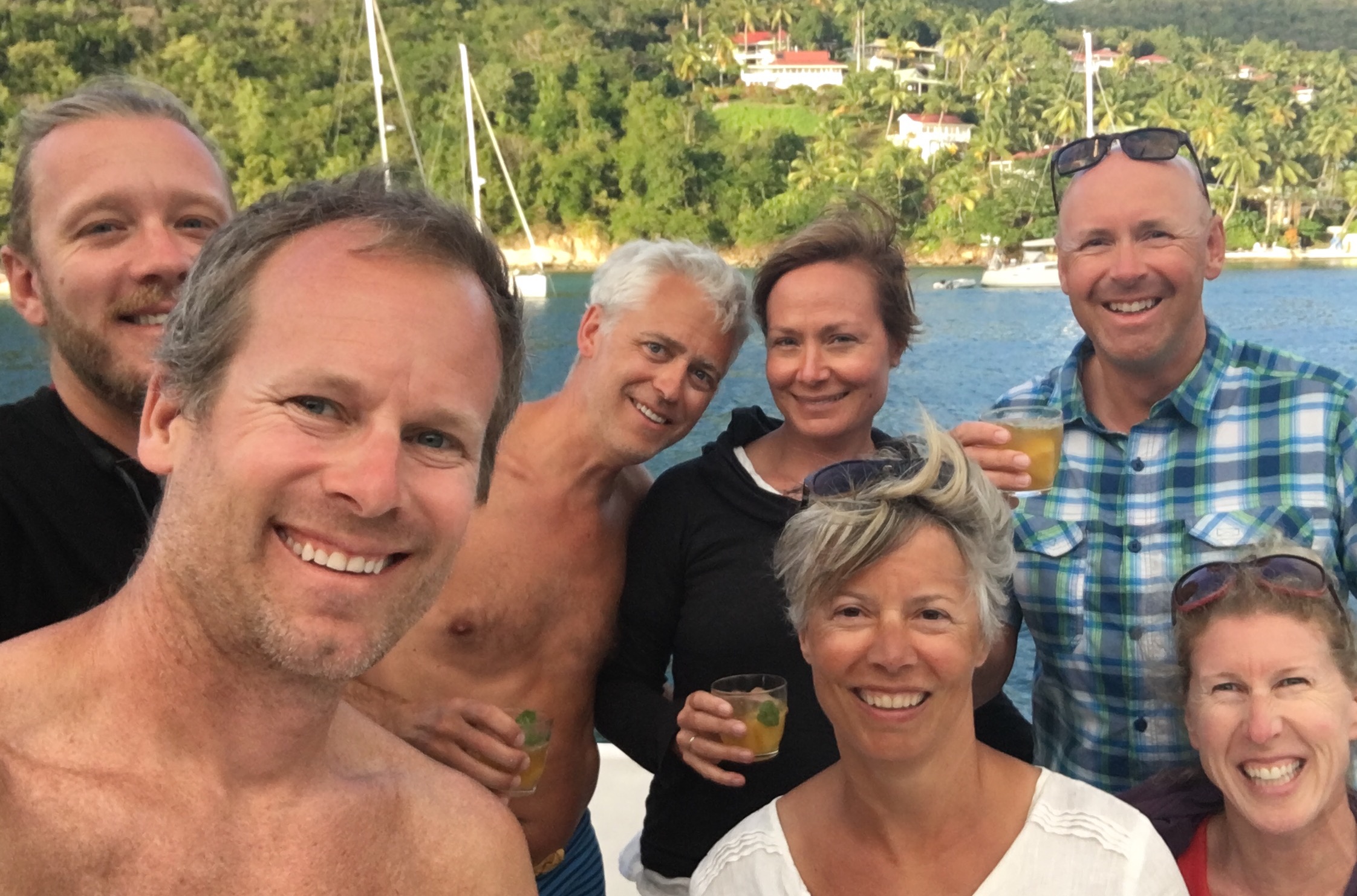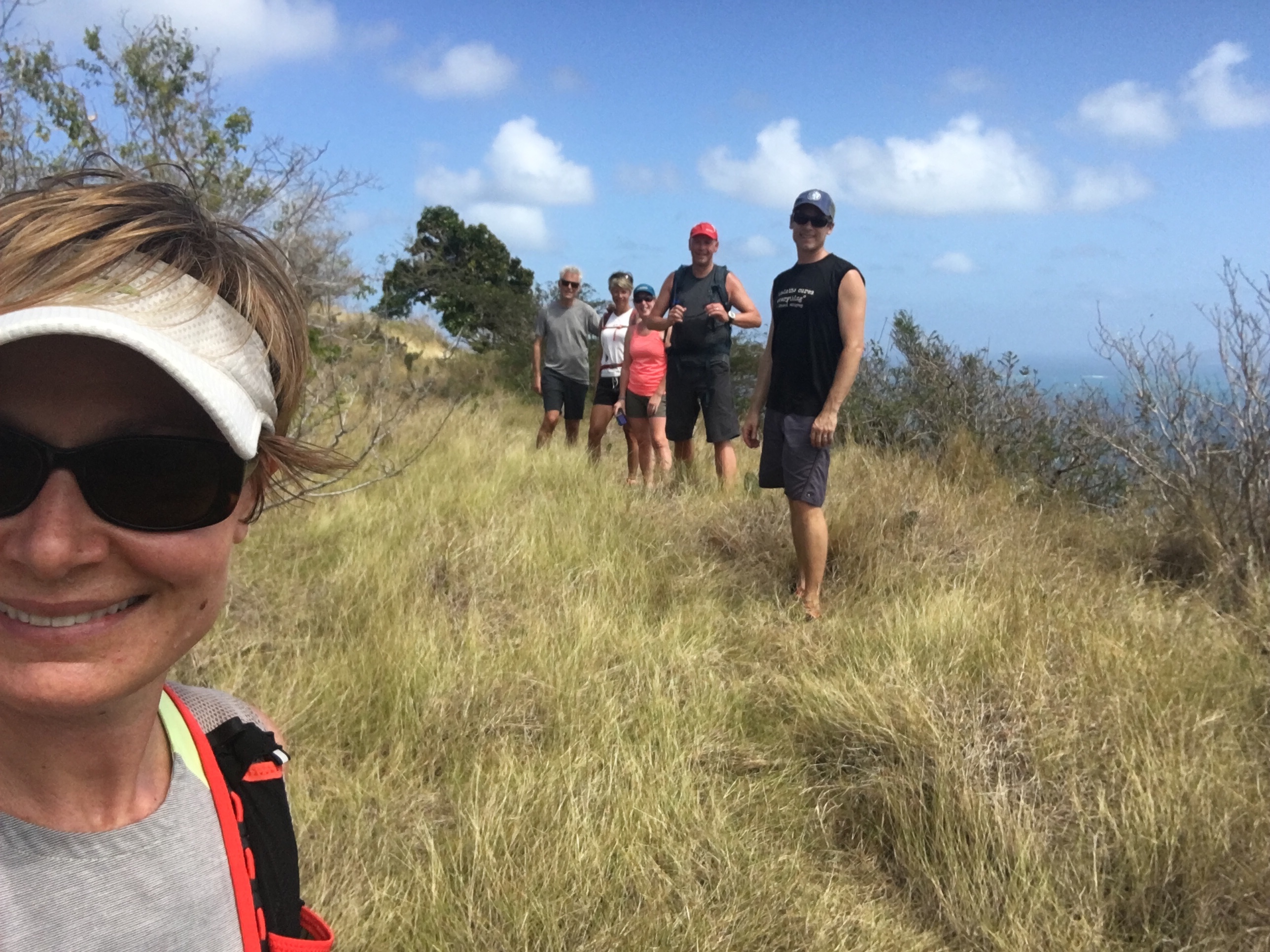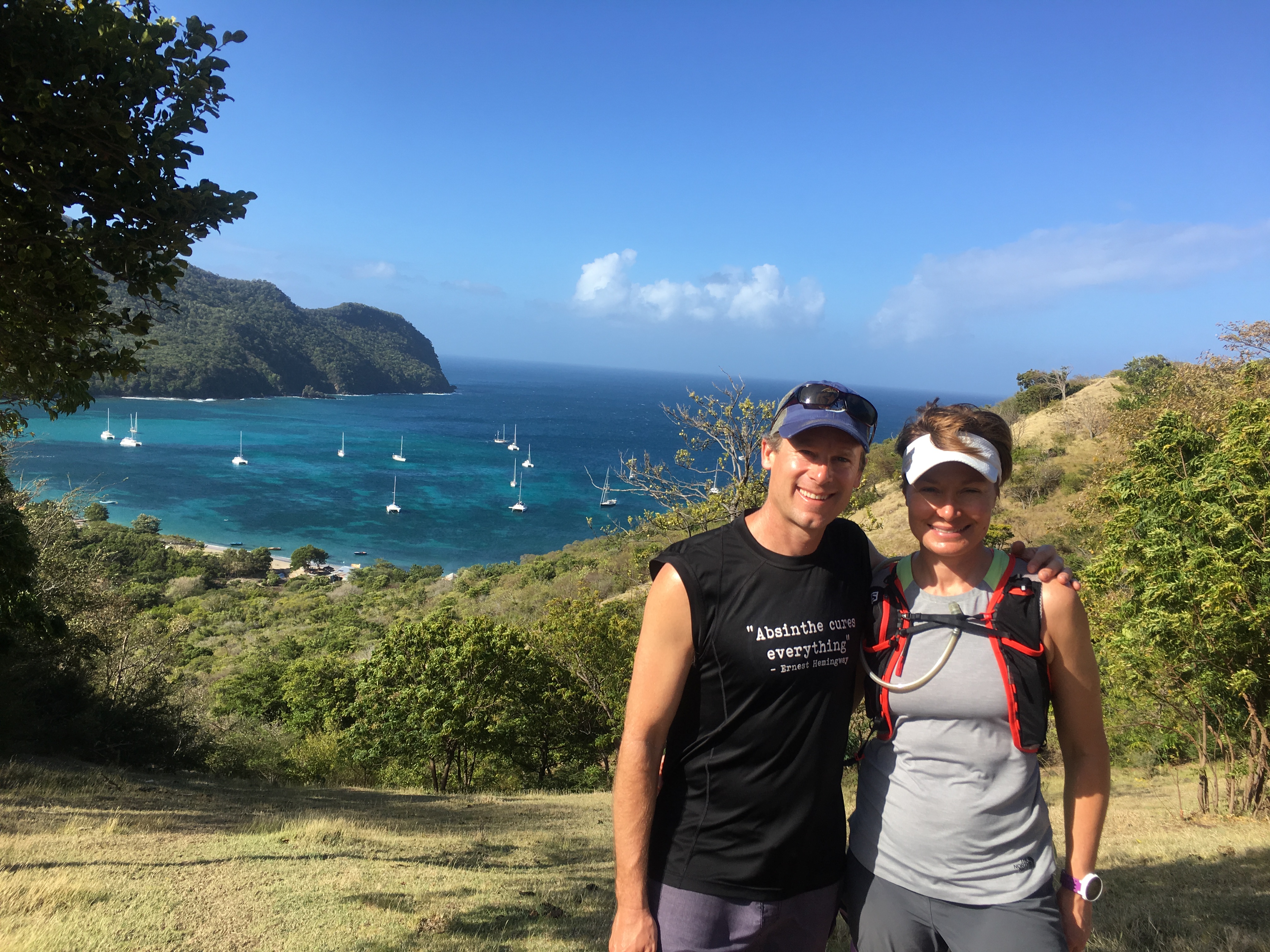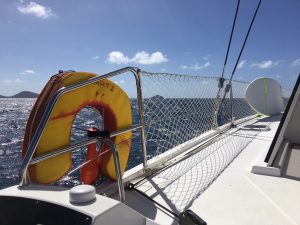 Leaving harbour, the only hint we have of what’s to come is the horizon, which is jagged, as if torn. Arnaud, our skipper, is French from France. Thirty-something and blonde with a sailor’s trim beard, he uses coconut oil to slick his hair into a man-bun and manages, somehow, to pull this off. He tells us he’s Buddhist, having just returned to the Caribbean from a silent retreat at an ashram in India. Most mornings on our trip, Arnaud wakes at dawn and spends 20 minutes meditating on the foredeck of the catamaran. At night, when he has us safely moored in a calm bay, he tries his best to say no to a drink. Without his sunglasses, his eyes are older than the rest of his face.
Leaving harbour, the only hint we have of what’s to come is the horizon, which is jagged, as if torn. Arnaud, our skipper, is French from France. Thirty-something and blonde with a sailor’s trim beard, he uses coconut oil to slick his hair into a man-bun and manages, somehow, to pull this off. He tells us he’s Buddhist, having just returned to the Caribbean from a silent retreat at an ashram in India. Most mornings on our trip, Arnaud wakes at dawn and spends 20 minutes meditating on the foredeck of the catamaran. At night, when he has us safely moored in a calm bay, he tries his best to say no to a drink. Without his sunglasses, his eyes are older than the rest of his face.
— If someone falls overboard, says Arnaud, you never take away your eyes. This is the number one rule of the boat. You call: “Man overboard,” but you let someone else grab the life ring and I will bring the boat around. One wave is like the next wave and the wave after that, as far as the eye can go. Look away, even for an instant, and you will never see this person again.
In nine days at sea, no one falls overboard, and yet we watch the waves for hours.
We watch and we watch and we watch because there is nothing else we can do on the long crossings between islands but keep our eyes fixed on the lurching horizon, our jaws clenched. We hadn’t expected ocean this rough or wind this strong. Novels, notebooks, and playing cards along with any plans we had for sunbathing — everything stays stowed away, out of the question, because of the sea and the howling wind. Arnaud is unruffled, a consummate professional: always serene, always in control.
The first day, after we clear the headlands, the waves are muscled and thick, rolling in rows like the heaving ribs of a beast angered by our passage. Three metres high, sometimes more, the waves toss the boat and the beast roars, enraged by our snapping sails.
We’ve heard stories of pirates in the Grenadines, we tell Arnaud our first night.
He shrugs.
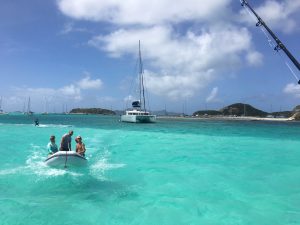 — Some of the islands where we will sail — Union, Mayreau, St. Lucia — the local peoples will come out to us in small boats, trying to sell things, he says. Maybe their clothes will be ragged and dirty, their hair will be a mess. Maybe they will have no teeth. That doesn’t mean they are pirates, that they are bad people: it means they are poor. They may reach with their hands through the portholes, but they can’t climb in — the windows are too small.
— Some of the islands where we will sail — Union, Mayreau, St. Lucia — the local peoples will come out to us in small boats, trying to sell things, he says. Maybe their clothes will be ragged and dirty, their hair will be a mess. Maybe they will have no teeth. That doesn’t mean they are pirates, that they are bad people: it means they are poor. They may reach with their hands through the portholes, but they can’t climb in — the windows are too small.
Another shrug.
— It is better to keep your valuables away from the windows.
Day two, back out on the open water, the waves charge past like mountains capped with frothy snow, like liquid semitrailers, like mounds of shuddering grey-green flesh that threatens to bury us in its folds. I promise myself I’ll write about them later, these waves, when it’s calmer. When we anchor or when I’m home on dry land, my stomach settled, I will remember the waves and their many disguises, and I will jot them down.
We meet no pirates. In the Tobago Cays, men putter past with outboard motors on battered skiffs selling bottled water, T-shirts, and BBQ On The Beach. They will ferry us to shore, for a fee, in boats named Bowl Head, Captain Neal, and Me Alone In The Valley.
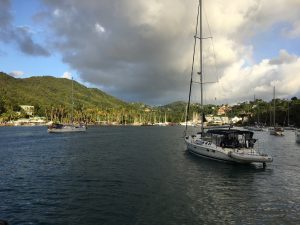 In Marigot Bay, a skinny boy standing upright on a tippy surfboard paddles out laden with bananas that will surely end up on the ocean floor. A man rowing around our boat in a bathtub and muttering under his breath stops to mumble with Arnaud, who treats everyone with respect. It seems the man may want to catch us a fish.
In Marigot Bay, a skinny boy standing upright on a tippy surfboard paddles out laden with bananas that will surely end up on the ocean floor. A man rowing around our boat in a bathtub and muttering under his breath stops to mumble with Arnaud, who treats everyone with respect. It seems the man may want to catch us a fish.
In Bequia, locals wearing clothes that are not quite ragged, but not quite new idle between the yachts in boats labelled Jean’s Laundry and Fresh Baguette. Two men drift past, one of them sculling, the other holding a live lobster above his head, which waves at us wanly.
The open water is more changeable and more fearsome.
Some days the waves are like men in a bar fight, surging together taut and angry, chests puffed, only to explode apart, their beer splashing.
Other times they are merely teenagers, boys in a locker room jacked on their own hormones, jostling and shouldering one another, eager for skin.
On calmer days, the waves dart and dash in the same direction, little girls in lacy skirts all racing along together until the littlest ones fall back, panting. Not a minute later, it’s their mothers I’m watching, choppy and conspiratorial, tucking their pointed heads together, then bursting apart in laughter.
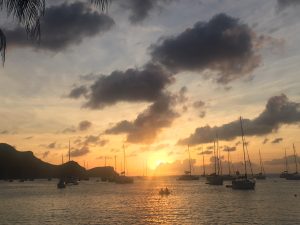 — I can tell you this now, Arnaud says, our last night. His eyes twinkle. Our final rough crossing behind us, we are safely moored in another tranquil cove and Arnaud has been pitching in to help us finish our considerable reserves of wine and rum.
— I can tell you this now, Arnaud says, our last night. His eyes twinkle. Our final rough crossing behind us, we are safely moored in another tranquil cove and Arnaud has been pitching in to help us finish our considerable reserves of wine and rum.
— Remember Canouan Island, where we stopped for lunch? One time, a long time ago now, I was the skipper for an Italian family and they liked this bay, so we put down the anchor for the night. I woke up past midnight and there was a man on board, rifling through our bags. He leapt into the water and tried to swim to shore, but I got in the dinghy and I chased him.
Arnaud laughs, but we don’t join in. Wide-eyed, we’re all thinking, how long ago exactly? And why tell us this now, when we still have one more night to survive at sea?
— I was so angry! I chased him in the boat, revving the engine — rrrrrrRRRRRRR, rrrrrrrRRRRRR! I wanted to run him over. He hid underneath the bridgedeck, swimming between the hulls, but I wouldn’t let him get ashore. Finally he said stop-stop-stop, and he put his arms up over the side of my dinghy and he had the money he’d stolen clamped between his teeth. The Italians were up on deck and they were scared and shouting at me, but I was so angry, like a crazy man, like a person I don’t even know. This man, the thief: I still wanted to kill him. I scared even myself that night.
The skipper is grinning now, his head swinging around the table from one landlubber to another. He’s hoping we find this as funny as he does, his tale of valour: the furious captain and the drowning pirate, duelling in the black of night. But we can’t picture this Arnaud, this stormy, tempestuous version of the man that’s kept us safe all week. The pilgrimage to the ashram and the morning meditation sessions now take on a new significance.
If we were to sail somewhere ever again — which we won’t — we would want this man at the helm.
That night, like all the others, I try to keep myself awake, straining to hear the creak of an oar, the patter of footfall on the deck. I steel myself for the hand snaking through my window and patting me down in my bunk.
It’s no good. The trickster waves, soft and slapdash, rock me swiftly to sleep.
